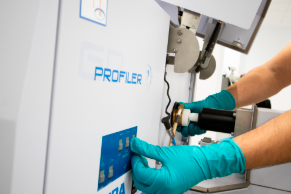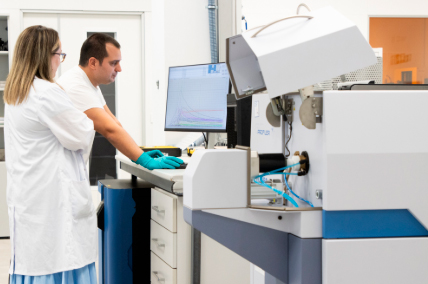The Initial IMO Strategy about reduction of GHG emissions from ships identifies levels of ambition related to a 2008 emission baseline: reduce CO2 emissions per transport work (carbon intensity index) of each mobility sector by at least 40% by 2030 and reduce the total annual GHG emissions by at least 50% by 2050. The new co-programmed European Partnership Zero Emission Waterborne Transport (ZEWT) aims to demonstrate by 2030, as a first step towards a drastic emission reduction by 2050, the new technological solutions needed to reach IMO objectives, for all main types of waterborne transport.
Surface Engineering
The spontaneous growth of tin filaments (whiskers) on the surfaces of electronic devices compromises the success of ESA’s space missions.
A whisker is a metallurgical phenomenon at the crystalline scale, resulting in the spontaneous growth of very thin filaments on metallic surfaces, particularly tin. This phenomenon has been studied for years on Earth, but no information is available on its growth in vacuum, especially in an orbital setting.
The European Space Agency (ESA) has documented several cases where commercial satellites have suffered system control processor (SCP) failures due to the growth of whiskers on electromagnetic relays. In several cases, both the main and auxiliary SCPs with which the satellites are equipped were rendered inoperative, leading to the failure of their respective aerospace endeavours. Therefore, among the tenders launched last year by the ESA to carry out research providing solutions to its most relevant problems, there is one aimed at studying the behaviour of these filaments in vacuum, and CIDETEC Surface Engineering has been the centre selected to spearhead it.
The specialised surface engineering centre aims to conduct a comparative analysis of the growth of whiskers under atmospheric and vacuum conditions to determine, as all indications suggest, whether there are differences in the behaviour of these filaments under such a different conditions. During the research, the filaments will be melted with micro-manipulators for the purpose of electrical characterization, thereby obtaining information on the appropriate measures to be taken to avoid subsequent malfunctions. By determining the characteristics of the whisker, it will be possible to ascertain the likelihood of a short-circuit occurring and, subsequently, to implement preventative measures.
The research and roadmap established by CIDETEC Surface Engineering experts will be facilitated by the participation of two leading European research centres, namely the Budapest University of Technology and Economics (BME) and the Polish Łukasiewicz-IMiF, the major references in Europe in surface engineering research in the field of whiskers.

The largest annual event on environmental policies in Europe, which took place from the 3rd to the 11th of June 2023.
As part of this initiative, the clustering workshop organized by EXELISIS on the 7th of June: Skills guiding the green transition of the plating industry, brought together EU funded projects NICKEFFECT, NOUVEAU, FREEME and MOZART joining forces to present the skills necessary for the green transition of different industries as the energy or the plating industry.
NICKEFFECT project is an innovative initiative coordinated by CIDETEC Surface Engineering which aims to develop new nickel-based materials with ferromagnetic character to replace scarce and costly platinum and platinum group metals in key applications as energy and digital storage sectors. The approach incorporates save and sustainable by design tools for materials selection.
The NICKEFFECT project brings together a multidisciplinary consortium of 12 partners from 7 different countries, ranging from scientific and technological developers to technology providers, end-users and cross-cutting partners.
CIDETEC Surface Engineering’s presentation was focused on the main challenges and opportunities posed by the project, as well as on the innovative approach and the expected results to be obtained with the development of these new materials.
CIDETEC Surface Engineering’s participation in the EU Green Week has been an excellent opportunity to advance the understanding of the sustainability issues involved in plating industry, as well as to establish contacts and synergies with other relevant EU projects and actors in the field of environmental policies and ecological transition.
We invite you to follow the news of the NICKEFFECT project through its website and social networks.
CIDETEC Surface Engineering has strengthened its position with the acquisition of equipment for the development of sustainable and recyclable hydrogen storage tanks, based on its 3R technology
CIDETEC Surface Engineering has added new Filament Winding equipment to its composite materials manufacturing process capabilities, enabling it to develop a new generation of lightweight hydrogen storage tanks (type IV), which will be more sustainable as the use of the 3R epoxy resin developed by CIDETEC (its patented 3R technology) makes them recyclable.
In this way, CIDETEC Surface Engineering reinforces its commitment and capabilities to advance in the development of hydrogen as a sustainable fuel for the decarbonisation of transport. CIDETEC is currently participating in the HAZITEK EcoH2Mov project – “New sustainable, lightweight and high-performance hydrogen storage tanks”, which began in July 2023 and in which it collaborates with 6 companies (Protec Arisawa, Mariskone, Rotobasque, Argolabe, Electroquímica Hernani and Innovation Tree). Within the framework of this project, the first prototype of a recyclable hydrogen storage tank based on the 3R technology developed by CIDETEC is expected to be validated (in the laboratory) by December 2024.
CIDETEC Surface Engineering, miembro de WindEurope, trabaja con los operadores de referencia en el sector a nivel mundial. Presente en toda la cadena de valor, comparte soluciones innovadoras y ofrece respuestas competitivas a los retos a los que se enfrenta el sector en los próximos años en términos de sostenibilidad y disminución de costes de mantenimiento. Entre otros, el sector eólico se ha fijado como objetivo disponer de una turbina completamente reciclable para el año 2040.
CIDETEC refuerza su equipamiento con la adquisición de un equipo RF-GDOES que servirá para desarrollar superficies y materiales para el transporte, distribución y almacenamiento de hidrógeno

Este nuevo equipo de espectroscopía de emisión óptica por lámpara de descarga luminiscente permite caracterizar la composición elemental y el espesor de recubrimientos multicapa y/o materiales conductores, no conductores e híbridos de alto valor añadido que, por su naturaleza y/o espesor, no pueden ser analizados con otras técnicas.
El equipo de caracterización RF-GDOES (Glow Discharge Optical Emission Spectroscopy), contribuirá a la generación de nuevo conocimiento sobre recubrimientos de diferente naturaleza, tratamientos superficiales y baterías que se desarrollan en CIDETEC, contribuyendo a dar respuesta a los principales retos científicotecnológicos de la industria nacional y europea. Entre las principales ventajas de este equipo resalta la posibilidad de realizar perfiles de composición elemental con alto grado de precisión y resolución (incluso elementos no detectables con otras técnicas como H, B…), para una amplia gama de recubrimientos (metálicos, orgánicos, cerámicos y composites), tanto de capa única como multicapa, lo que permitirá generar conocimiento científico de nivel y avanzar en las investigaciones de CIDETEC Surface Engineering.
De entre los proyectos que se llevan a cabo en CIDETEC Surface Engineering, la adquisición de un equipo de caracterización como es el equipo GDOES es destacable para los proyectos relacionados con el transporte, distribución y almacenamiento del hidrógeno como combustible, en los que la detección de este elemento en los recubrimientos/materiales es crucial para su desarrollo.










